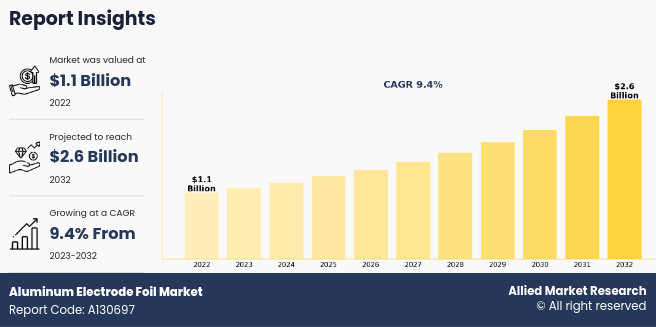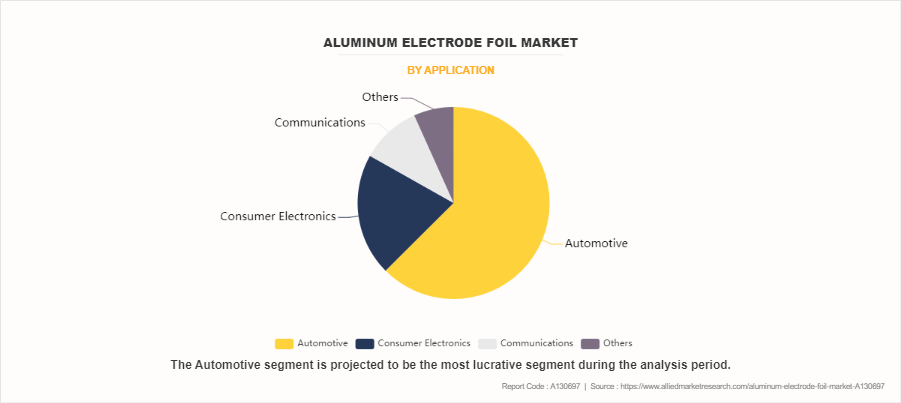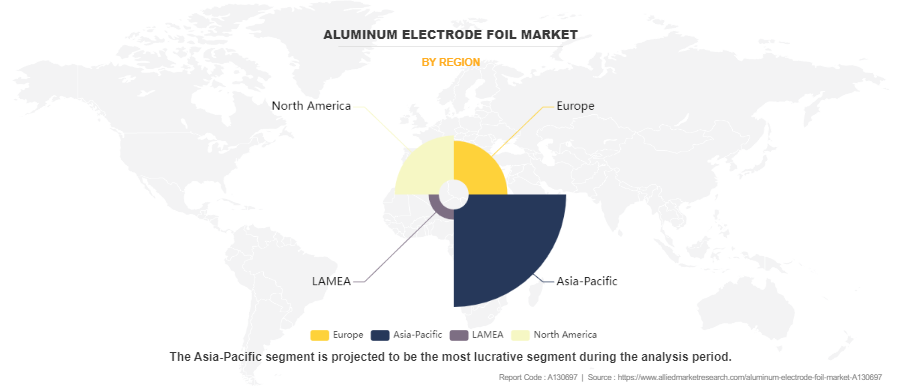Aluminum Electrode Foil Market Research, 2032
The global aluminum electrode foil market was valued at $1.1 billion in 2022 and is projected to reach $2.6 billion by 2032, growing at a CAGR of 9.4% from 2023 to 2032. Increase in demand for lightweight materials in automotive and aerospace industry is expected to drives the growth of aluminu electrode foil market. Aircraft weight directly impacts fuel consumption. By utilizing lightweight materials like aluminum electrode foil, aircraft manufacturers can reduce weight, leading to improved fuel efficiency and lower operating costs. However, competition from alternatives is expected to hinder market growth to some extent. Moreover, the emergence of flexible and stretchable electronics is expected to offer remunerative opportunities for the expansion of the global aluminum electrode foil market.

Introduction
Aluminum electrode foil, commonly referred to as aluminum foil, is a thin sheet of aluminum metal typically used as an electrode in various applications across numerous industries. Aluminum electrode foil serves as a conductor of electricity due to aluminum's inherent conductivity properties. Its high electrical conductivity makes it an ideal choice for applications requiring efficient transmission of electrical current. Aluminum electrode foil finds extensive use in capacitors in the electronics sector, where it serves as the electrode material in aluminum electrolytic capacitors. These capacitors are widely employed in electronic devices ranging from consumer electronics to industrial equipment, owing to their ability to store and release electrical energy efficiently.
Moreover, aluminum electrode foil plays a crucial role in lithium-ion batteries used in various electronic devices such as smartphones, laptops, and electric vehicles. It serves as a current collector, enabling the smooth flow of electrons during the battery's charging and discharging processes. Its lightweight nature and excellent conductivity contribute to the overall performance and efficiency of lithium-ion batteries, making them a preferred choice for energy storage applications.
Furthermore, aluminum electrode foil is extensively used in the packaging industry for its barrier properties and flexibility. Aluminum foil serves as a barrier against moisture, light, and bacteria, making it an ideal material for food packaging, pharmaceutical packaging, and other perishable goods. Its ability to maintain the freshness and integrity of packaged products extends shelf life and ensures product quality, thereby enhancing consumer safety and satisfaction.
Key Takeaways
- The aluminum electrode foil industry market study covers data for a minimum of 20 countries. The research includes a segment analysis of each country in terms of value ($thousand) and (thousand tons) for the projected period (2023-2032).
- The study integrates high-quality data, professional opinions and analysis, and critical independent perspectives. The research approach is intended to provide a balanced view of the global aluminum electrode foil market and to assist stakeholders in making educated decisions to achieve their growth objectives.
- Over 3,700 product literature, annual reports, industry statements, and other comparable materials from major industry participants were reviewed to gain a better understanding of the market.
- The aluminum electrode foil market is highly fragmented with several players, including AiSHi Capacitors, Nantong Haixing Electronics Co., Ltd, TOYO ALUMINIUM K.K., SATMA PPC, UACJ Corporation, Nippon Light Metal Co., Ltd, TDK Foil Italy S.p.A., JCC, Shin-Etsu Chemical Co., Ltd., and Gelon Lib Group Co., Ltd. These players have adopted key developmental strategies such as acquisitions, product launches, mergers, and expansion to strengthen their foothold in the market.
Market Dynamics
Increase in demand for aluminum electrode in the electronics industry is expected to drive the growth of the aluminum electrode foil market during the forecast period. Aluminum electrode foil is commonly used in the production of capacitors due to its high surface area, which allows for increased capacitance in a compact form factor. Capacitors are essential components in electronic circuits, used for energy storage, filtering, and signal coupling. Aluminum electrode foil is also utilized in various types of batteries, including lithium-ion batteries. These batteries are widely used in portable electronic devices such as smartphones, laptops, and tablets, as well as in electric vehicles and renewable energy storage systems. Aluminum foil is used as the cathode current collector in lithium-ion batteries due to its lightweight, high conductivity, and ability to withstand corrosive environments.
However, competition from other materials is expected to restrain the growth of the aluminum electrode foil market during the forecast period. Copper foil is a primary competitor to aluminum electrode foil, especially in applications where high conductivity is crucial, such as in high-frequency circuits and power electronics. Copper foil typically offers higher conductivity than aluminum, making it preferred in certain high-performance applications. However, copper is heavier and costly as compared to aluminum, which is expected to limit its suitability of aluminum electrode foil where weight and cost are significant factors. Carbon-based materials, including graphite foil and carbon nanotubes, are competition of aluminum electrode foil in various applications, in energy storage devices such as batteries and supercapacitors. These materials provide distinctive features such as superior electrical conductivity, high specific surface area, and flexibility, offering advantages in specialized applications. The growing popularity of carbon based materials such as graphite foil and carbon nanotubes is expected to restraint the growth of aluminum electrode foil market during the forecast period.
Segments Overview
The aluminum electrode foil market is segmented into type, application, and region. On the basis of type, the market is divided into anode foil and cathode foil. On the basis of application, the market is categorized into consumer electronics, automotive, communications, and others. Region-wise, the market is studied across North America, Europe, Asia-Pacific, and LAMEA.

On the basis of type, the cathode foil segment dominated the aluminum electrode foil market accounting for mor than half of the aluminum electrode foil makret revenue. In batteries, aluminum electrode foil serves as the cathode current collector. It provides a conductive surface for the cathode material to adhere to and helps in the efficient transfer of electrons during the charge and discharge cycles. Aluminum foil is preferred due to its high conductivity, lightweight nature, and corrosion resistance. Aluminum foil is also used as a cathode foil in aluminum electrolytic capacitors. These capacitors utilize an electrolyte and aluminum oxide as the dielectric. The aluminum foil serves as the cathode, with the aluminum oxide layer forming on its surface during the manufacturing process. This oxide layer acts as the dielectric, enabling the storage of electrical energy.

Based on the application, the automotive segment held the highest market share in 2022, accounting for three fifth of the global aluminum electrode foil market revenue and is likely to retain its dominance throughout the forecast period. Aluminum electrode foil facilitates the integration of battery management systems (BMS) in electric vehicles. The conductive properties of the foil enable efficient monitoring and control of battery parameters such as voltage, temperature, and state of charge, contributing to the overall safety and performance of the vehicle. The production of lithium-ion batteries, aluminum electrode foils are essential for providing a conductive surface for the deposition of active materials such as lithium cobalt oxide (LiCoO2), lithium iron phosphate (LiFePO4), and others. These foils help facilitate the flow of electrons during charging and discharging processes.

Based on region, Asia-Pacific held the highest market share in terms of revenue in 2022, accounting for half of the global aluminum electrode foil market revenue. Aluminum electrode foils are used in lithium-ion batteries, which are widely used in consumer electronics, electric vehicles, and energy storage systems. Aluminum electrode foils are used in aluminum electrolytic capacitors, which are essential components in electronic devices for energy storage and signal filtering. The electronics manufacturing industry in countries such as China, Japan, and South Korea, drives the demand for aluminum electrode foils for capacitor production.
Cometitive Analysis
The major players operating in the aluminum electrode foil market include AiSHi Capacitors, Nantong Haixing Electronics Co., Ltd, TOYO ALUMINIUM K.K., SATMA PPC, UACJ Corporation, Nippon Light Metal Co., Ltd, TDK Foil Italy S.p.A., JCC, Shin-Etsu Chemical Co., Ltd., and Gelon Lib Group Co., Ltd.
Recent Key Developments in Aluminum Foil Industry
- In August 2022, Amcor has acquired a flexible packaging plant in the Czech Republic, enhancing its capacity to meet growing customer demand in Europe for food packaging. This strategic move strengthens Amcor's presence and ability to supply laminates, pouches, and bags to its European market.
- In July 2022, Novelis, known for sustainable aluminum solutions, revealed plans to enter the cosmetic packaging sector. Their products, made from 100% recycled aluminum, offer eco-friendly packaging options for beauty, skincare, and wellness brands, providing a recyclable alternative to plastic.
Historic Trends of the Aluminum Electrode Foil Market
- In the 1930s, advancements in aluminum processing techniques paved the way for the production of electrode foils tailored for specific applications in industries such as electronics and energy.
- In the 1970s the energy sector begins to explore alternative sources of power, including solar energy. Aluminum electrode foils play a crucial role in the development of solar panels, contributing to the growth of renewable energy technologies.
- In the 1990s, the rise of portable electronic devices and the burgeoning electric vehicle industry led to a surge in demand for lightweight yet durable materials for batteries. Aluminum electrode foils emerged as integral components in lithium-ion batteries.
- In the 2020s, aluminum electrode foils continue to be indispensable components across various industries, owing to their unique properties and versatility. Aluminum electrode foils are vital components in the manufacture of numerous consumer electronic devices such as smartphones, tablets, laptops, and wearable technology. They are used in lithium-ion batteries, which power these devices, serving as the current collector within the battery cell.
Key Benefits For Stakeholders
- This report provides a quantitative analysis of the market segments, current trends, estimations, and dynamics of the aluminum electrode foil market analysis from 2022 to 2032 to identify the prevailing aluminum electrode foil market opportunities.
- The market research is offered along with information related to key drivers, restraints, and opportunities.
- Porter's five forces analysis highlights the potency of buyers and suppliers to enable stakeholders make profit-oriented business decisions and strengthen their supplier-buyer network.
- In-depth analysis of the aluminum electrode foil market segmentation assists to determine the prevailing market opportunities.
- Major countries in each region are mapped according to their revenue contribution to the global market.
- Market player positioning facilitates benchmarking and provides a clear understanding of the present position of the market players.
- The report includes the analysis of the regional as well as global aluminum electrode foil market trends, key players, market segments, application areas, and market growth strategies.
Aluminum Electrode Foil Market Report Highlights
| Aspects | Details |
| Market Size By 2032 | USD 2619 million |
| Growth Rate | CAGR of 9.4% |
| Forecast period | 2022 - 2032 |
| Report Pages | 277 |
| By Type |
|
| By Application |
|
| By Region |
|
| Key Market Players | SATMA PPC, Shin-Etsu Chemical Co., Ltd., TOYO ALUMINIUM K.K., TDK Foil Iceland ehf., Gelon Lib Group Co., Ltd., JCC, AiSHi Capacitors, Nantong Haixing Electronics Co., Ltd., Nippon Light Metal Co., Ltd., UACJ Corporation |
Analyst Review
According to the opinions of various CXOs of leading companies, the aluminum electrode foil market was dominated by the cathode foil segment. In supercapacitors, aluminum foils are employed as cathodes to store electrical energy. Supercapacitors have high power density and can quickly charge and discharge, making them suitable for applications requiring rapid energy release, such as regenerative braking systems in hybrid vehicles.
Increase in demand for energy storage solutions drives the growth of aluminum electrode foil market. As the automotive industry transitions towards electrification, the demand for high-performance lithium-ion batteries continues to grow. Aluminum electrode foil is a critical component in lithium-ion battery manufacturing, serving as the current collector for the cathode and anode materials. Its lightweight nature helps reduce the overall weight of the battery pack, contributing to improved vehicle efficiency and range. Moreover, aluminum's excellent conductivity enhances the battery's performance by facilitating efficient electron flow during charging and discharging cycles.
However, the price volatility of raw materials is expected to restrain industry expansion. Aluminum is a primary raw material used in the production of aluminum electrode foil. Fluctuations in the price of aluminum, driven by factors such as global supply and demand dynamics, currency fluctuations, trade policies, and geopolitical tensions, can directly impact the cost of production. Sudden spikes in aluminum prices can lead to increased production costs for aluminum electrode foil manufacturers, squeezing profit margins. Price volatility introduces uncertainty into the cost structure of aluminum electrode foil production. Manufacturers may find it challenging to predict and manage their input costs effectively, especially in the long term. This uncertainty can make financial planning and budgeting more difficult and affect investment decisions related to capacity expansion or technology upgrades.
The global aluminum electrode foil market was valued at $1.1 billion in 2022 and is projected to reach $2.6 billion by 2032, growing at a CAGR of 9.4% from 2023 to 2032.
The major players operating in the aluminum electrode foil market include AiSHi Capacitors, Nantong Haixing Electronics Co., Ltd, TOYO ALUMINIUM K.K., SATMA PPC, UACJ Corporation, Nippon Light Metal Co., Ltd, TDK Foil Italy S.p.A., JCC, Shin-Etsu Chemical Co., Ltd., and Gelon Lib Group Co., Ltd.
The aluminum electrode foil market is segmented into type, application, and region. On the basis of type, the market is divided into anode foil and cathode foil. On the basis of application, the market is categorized into consumer electronics, automotive, communications, and others. Region-wise, the market is studied across North America, Europe, Asia-Pacific, and LAMEA.
Increase in demand for energy storage solutions and rise in medical device innovation are the main drivers of aluminum electrode foil market.
Asia-Pacific is the largest region of aluminum electrode foil market.
Automotive is the leading application of aluminum electrode foil market.
Increase in demand for off-grid power solutions are the upcoming trends of aluminum electrode foil market.
Loading Table Of Content...
Loading Research Methodology...



